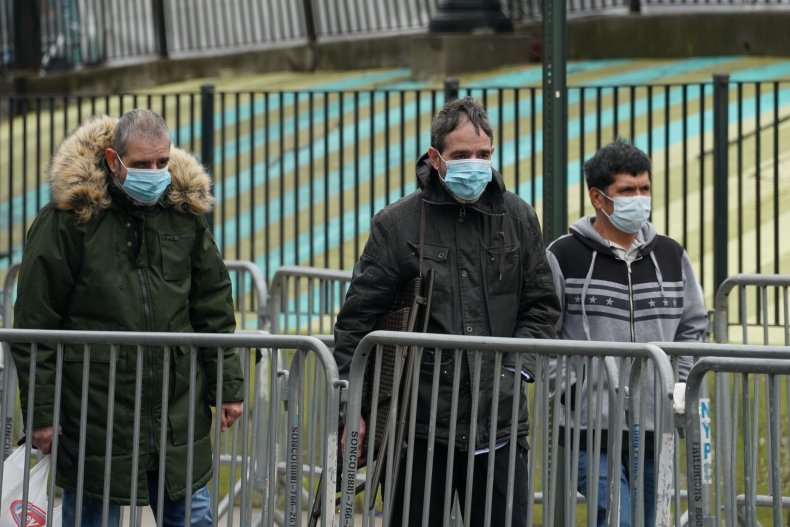U.S. COVID cases have been declining for several days, suggesting the country as a whole might have seen the peak of the summer Delta wave. But the winter remains uncertain, experts have told Newsweek.
According to data from the Centers for Disease Control and Prevention (CDC), the country's seven-day moving average of cases has been declining since September 14, when the daily average of new cases was just under 150,000. On September 24, the most current date displayed by the health agency's data tracker, the average had decreased to around 114,000.
The country's surge in infections over the summer came as the Delta variant of COVID became dominant, accounting for the vast majority—nearly 100 percent—of sequenced samples.
Srini Venkatramanan is a research assistant professor at the Network Systems Science and Advanced Computing (NSSAC) division at the University of Virginia, which runs a COVID surveillance dashboard. He and his team build statistical models that track the trajectory of epidemics to make short- and medium-term forecasts.
Regarding the current COVID case data in the U.S., he told Newsweek that from the latest set of updates, short-term forecasts are pointed downwards, "hinting that we may have peaked as far as the Delta wave is concerned, at the national scale."
He added: "There are a few states still trending upwards, although their rate of growth seems to have slowed.
"Similarly, we participate in a multi-model effort where our recent projections focused on the impact of childhood vaccinations. Even in that setting, the ensemble model indicates a downward trend for the current wave."
Jeffrey Shaman, a professor in the Department of Environmental Health Sciences at the Columbia University Mailman School of Public Health, echoed the point.
"Our own projections have fairly consistently projected a peak around the last week of August/first week of September for the U.S. nationally," he said. "This appears to have occurred."
One of the reasons why Delta is slowing down may be that the variant is simply having trouble finding new people to infect, according to Nicholas Reich, professor of biostatistics at the University of Massachusetts, Amherst.
He told Newsweek that this could be due to a mixture of people having already been infected and vaccinations helping the remaining population. He uses the Scenario Modeling Hub for glimpses at what the future of COVID might hold.
"I am guardedly optimistic about the results from the Scenario Hub that we are nearing a point where the Delta wave has left us with few people still susceptible to COVID," he said. "However, I think it's really challenging to turn that knowledge into a specific quantitative prediction of when the peak will be or whether the case loads will decline smoothly through the winter months."
The Long View
The question remains as to whether we will see a winter surge similar to that of 2020. This time last year, daily cases were flat at around 40,000 and were about to launch into a steep increase, rather than heading downwards as they currently are.
But looking longer term is difficult. There are many uncertainties to account for, including the duration of immunity from vaccines or natural infections, as well as the emergence of new variants and more. Human behavior is also tricky to predict.
"I think we are past the current peak," said Shaman. "What the winter holds and whether a new variant will emerge remains unknown."
For instance, Venkatramanan noted that while short-term projections might suggest a decline, upswings are observed in scenarios where a hypothetical new variant is introduced.
Reich approached long-term projections, such as those that show case numbers of hospitalizations months from now, with skepticism. Through the COVID-19 Forecast Hub, he's been keeping track of dozens of teams' forecasts over the last 18 months, and drawing an accurate curve for more than a few weeks ahead of time has proven "very challenging."
"Separately, I think that influenza is a sleeper candidate to disrupt life this fall and winter. Because so little influenza circulated last winter, we likely have quite a bit less population immunity than we usually do heading into a flu season.
"That said, masks and distancing seemed to help keep flu season at bay last year, so maybe that will help this year as well."

"peak" - Google News
September 27, 2021 at 10:03PM
https://ift.tt/2XQ2iJF
When Will Delta Variant Peak? Winter Uncertain As COVID Cases Drop in U.S. - Newsweek
"peak" - Google News
https://ift.tt/2KZvTqs
https://ift.tt/2Ywz40B
Bagikan Berita Ini















0 Response to "When Will Delta Variant Peak? Winter Uncertain As COVID Cases Drop in U.S. - Newsweek"
Post a Comment